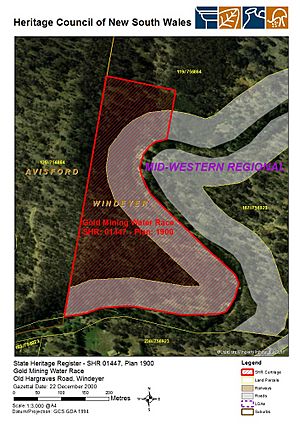Gold Mining Water Race, Windeyer facts for kids
Quick facts for kids Gold Mining Water Race |
|
|---|---|

Heritage boundaries
|
|
| Location | Old Hargraves Road, Windeyer, Mid-Western Regional Council, New South Wales, Australia |
| Built | 1855–1865 |
| Official name: Gold Mining Water Race; Water Race; Chinese Wall | |
| Type | state heritage (archaeological-terrestrial) |
| Designated | 22 December 2000 |
| Reference no. | 1447 |
| Type | Water Race |
| Category | Mining and Mineral Processing |
| Lua error in Module:Location_map at line 420: attempt to index field 'wikibase' (a nil value). | |
The Gold Mining Water Race is an amazing old structure in Windeyer, Australia. It was built a long time ago, between 1855 and 1865. Chinese miners, likely from Southern China, built it to help them find gold. Today, it's a special heritage site, recognized on the New South Wales State Heritage Register.
History of the Gold Race
Gold Rush in Windeyer
The Windeyer area became very popular during the New South Wales gold rush in the late 1850s. Many people came looking for gold. At its busiest, about 1200 Chinese miners lived and worked in the area.
Who Built the Wall?
This special wall was built by Chinese miners. They often worked on mining sites that European miners had already left. We don't know if they were the first to mine here, but they certainly made a big impact.
A Team Effort
It's believed that about 12 Chinese men built this large wall. They even had a cook to support them! Building such a big structure would have taken a lot of time and effort. This suggests they were paid for their work or received supplies while on the project. They might have been contract workers, hired for this specific job.
What is the Water Race?
Following the Meroo River
This impressive wall is built right next to the Meroo River. It follows the river's path for about 350 meters. The wall's height changes, from just a few stones high to an amazing 3.6 meters (about 12 feet) tall. Many parts are over 1.8 meters (6 feet) high.
How the Wall Was Built
The wall is a "dry stone" wall. This means it was built using rocks without any mortar or cement to hold them together. The miners used flat, rectangular shale rocks found right there at the site. These rocks were laid carefully on their sides. Some rocks were quite large, about 600mm by 600mm.
The Water Channel
At the very top of the wall, there's a "water race." This is a channel that carried water. The water race starts upstream in the Meroo River and travels about 1 kilometer in total. It brought water from the river to the gold mining areas.
Condition of the Wall
Much of the wall is still in great shape today. Some parts look almost new, showing how skilled the builders were. While some sections have small breaks, and some plants like blackberries have grown, most of the wall is still easy to see and explore.
Other Mining Features
Near the wall, you can also find other signs of the old mining days. There are deep, round holes where miners dug for gold. You might also see mounds of "tailings," which are piles of leftover dirt and rocks from the mining process. There are even remains of what might have been a dwelling.
Why is it Important?
A Link to Chinese History
The Gold Mining Water Race is very important because it shows how much Chinese people contributed to Australia's history. This wall is special because it was built entirely by Chinese miners. It's a strong reminder of their presence during the gold rush.
Amazing Engineering Skills
The miners built this wall to help them find gold in the Meroo River valley. It's much taller than most similar structures and was built in a very difficult, rocky area. They used simple tools like a wooden bow and a plumb bob (a tool to check if something is perfectly straight or level) to make sure the water flowed correctly over a long distance. The wall's excellent condition today shows just how skilled these Chinese builders were.
A Rare and Unique Site
Walls like this, especially ones so tall and long, are quite rare. The landscape, with its steep hills and available shale rocks, made it possible. The rich gold found here also made such a big project worthwhile. It's a great example of how miners used clever ideas to get water to their digging sites. This allowed them to process much more gold-rich dirt than if they had to carry it all to the river.
Community and Teamwork
This project was a huge team effort that took a long time. It shows the strong friendship and cooperation among the 12 Chinese miners. Their achievement, building such a large structure with only basic tools and materials, is truly impressive.
Learning from the Past
This site can teach us a lot about the history of New South Wales. It shows how people used their cleverness and skills to overcome challenges during the gold rush. By studying it, we can understand more about the lives of the Chinese miners and their impact on Australia.

